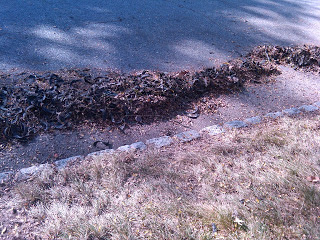MH and I, who have been married for decades, aren't ones for big parties or exotic locales. We do things our own way. We renew our vows every Autumn when we must go into the backyard and tackle raking the fallen leaves.
 |
| Maple leaves, before the fall (Margo D. Beller) |
That changed very recently when the winds started blowing and we had a brief warmup. There are now many more bare trees, or trees where the leaves are shriveled and brown, the overwhelming color.
 |
| I had to rake pods to the curb last year but not this year! (Margo D. Beller) |
This year, there are few pods on the front lawn and the bulk of the leaves are in the back. We used to use a bed sheet in our raking but now use a very large tarp, which means fewer but heavier trips to the curb.
The other day was our first foray into this year's raking (this does not count when MH used his mower for the last time to mulch the leaves, or I collected leaves in a leaf vac to put into compost). We have a routine. I take out the blower we bought after the first year of raking and herd the leaves into piles. MH comes out with his gloves and rake and starts pulling other leaves from the edges to those piles. I grab my own rake and start putting the piles into the tarp we've spread out. He goes to the opposite side of the tarp from where I work and does the same. We hold down the tarp edges with our feet to get as many leaves in as we can. I push leaves into the center to make room for more. By the time we decide it can take no more, we have a heavy load to drag to the front of our house.
Befitting our personalities, he quietly does his job while I noisily try to get him to do something to, I think, make the process more efficient. He listens and agrees about half the time.
 |
| Black-capped chickadee (Margo D. Beller) |
Same with the raven we hear croaking its call as it flies overhead. Ravens used to be found in high elevations but we've been hearing them more often in our neighborhood, which is only about 400 feet above sea level. We stop to look for it and see its wide, spade-like tail as it sails by. I am impressed by MH. He has become more of a birder now after all our years together. Although most of the time he says he can't identify even the most common of birds without my help, there are some he now knows after being willing to listen to their calls. Having more eyes and ears out in the field is a great help to me.
 |
| Brook color (Margo D. Beller) |
I think of how I used to do a lot myself. But now, while I can rake, use the blower (which shakes me painfully) and even put leaves into a tarp, there is no way I can drag down a heavy, leaf-laden tarp or empty it alone anymore. For that, as with so many things, I need my partner.
As if to mock us, the day after we finish our raking the wind blows and the lawn becomes more littered than it was before. Way too many leaves to use the mower on them. We'll just wait for the rest to come down, go out with rakes and tarp and then finish the job for another year. Until then, there's no rush.

No comments:
Post a Comment